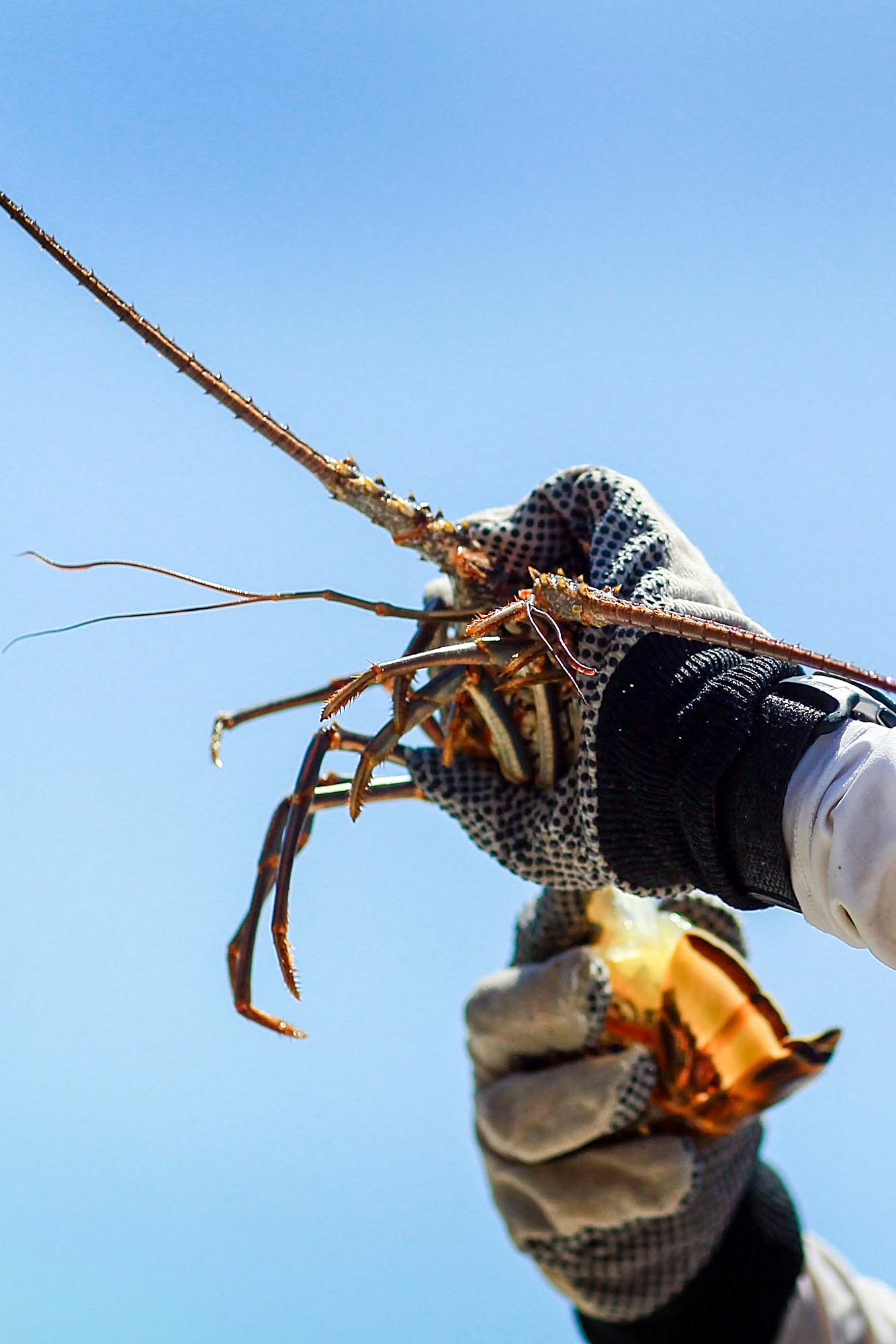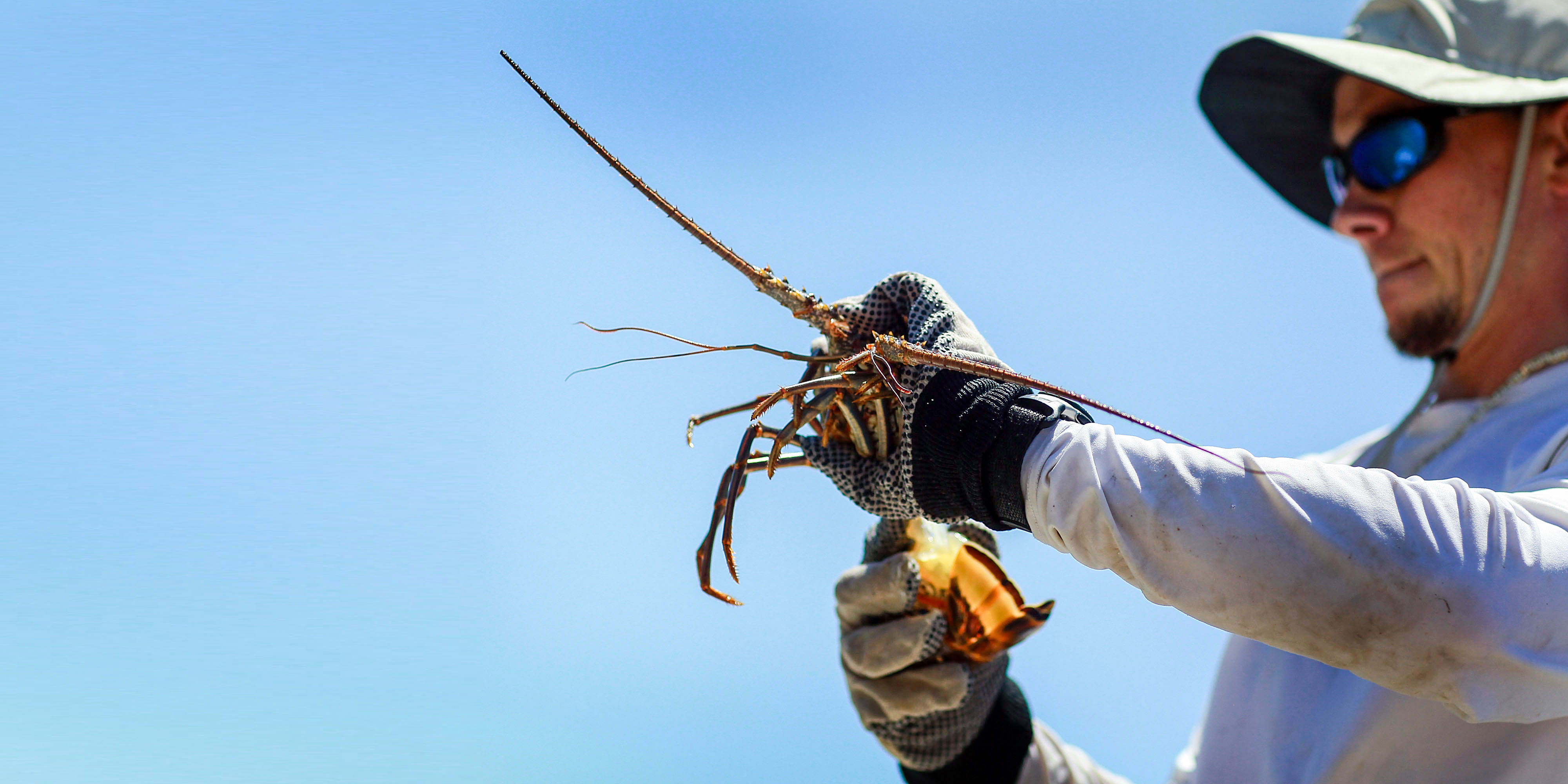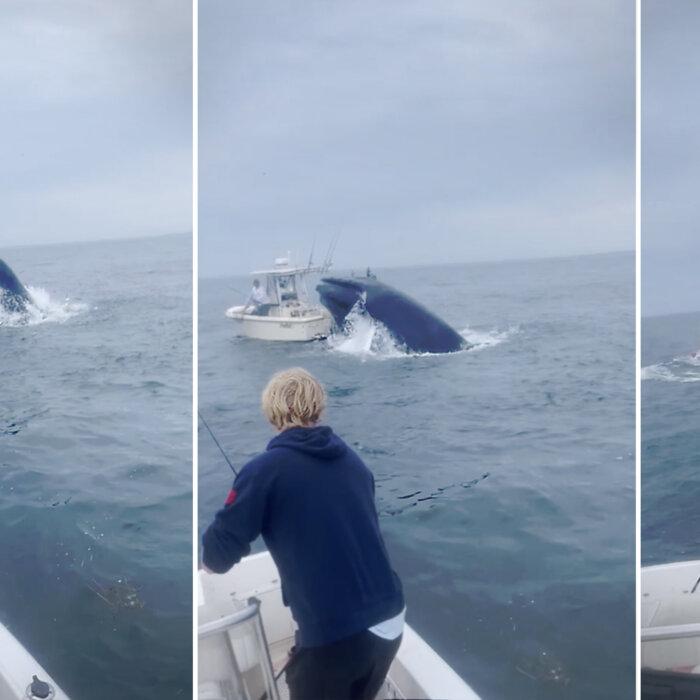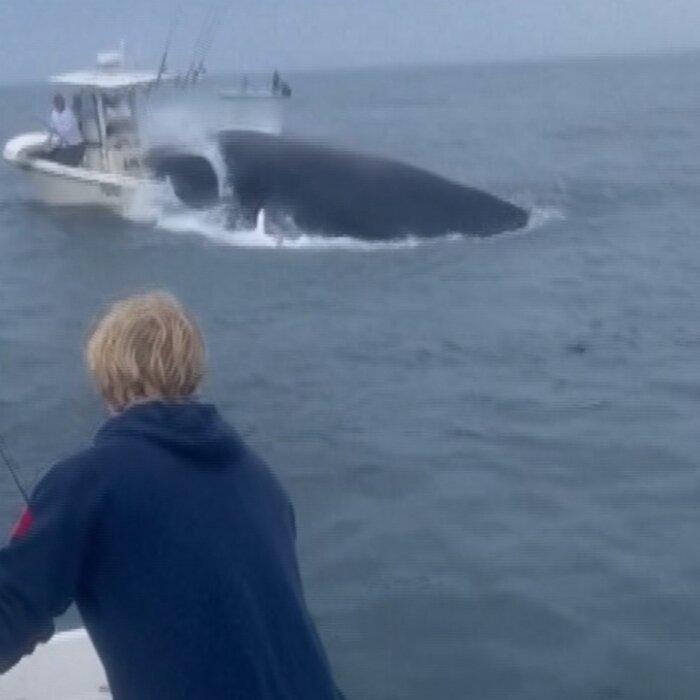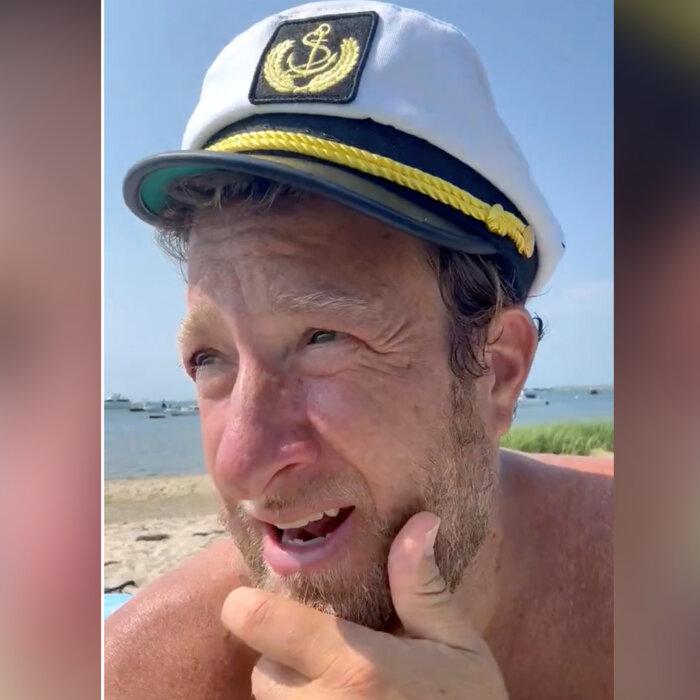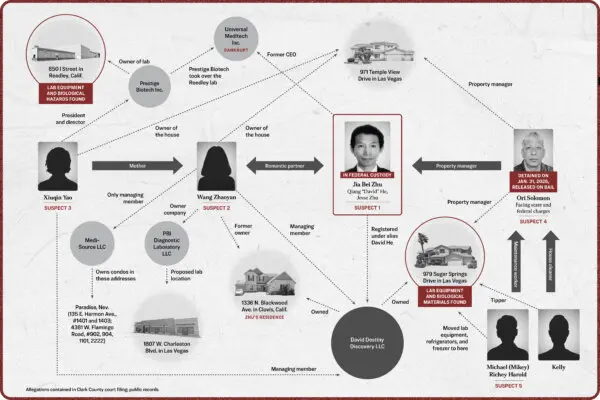SUMMERLAND KEY, Fla.—“The Turk” was anchored off near the southern tip of Florida, and the small boat had divers in the water when a large fishing vessel cruised directly over the dive site.
The smaller boat’s owner, dentist Jeff Pacha, watched furiously, anxiously. He worried, knowing as little as 13 feet of water might separate his wife and daughter—the two divers searching for lobsters on the ocean floor—from the intruder’s two sharp propellers.
Despite Pacha’s diver-down flag, the incoming boater idled across the area, presumably looking for a spot to anchor within the 100-yard safety perimeter the flag commands in open water.
Pacha waved and shouted. And the other vessel eventually turned and slowly moved away.
Pacha’s wife and daughter were able to return to the surface unharmed. But the scene repeats far too often this time of year, sometimes with deadly consequences, Pacha told The Epoch Times.
The dangerous encroachment illustrates the risks of seeking what’s known as a tasty treasure during Florida’s annual lobster mini-season.
During this year’s mini-season, which ran from July 24 to 25, one diver was hospitalized after being struck by a boat. Two other boating accidents required rescues, according to the Florida Fish and Wildlife Conservation Commission (FWC).
What caused excitement to boil over was the annual early chance to find Florida’s spiny lobster.
The state’s regular season for lobster runs from midnight on Aug. 6 until a minute before midnight on March 31. The first two weekends are the busiest, Pacha said.
But for two days every summer, enthusiasts from around the country dive into what could be their best chance to seize their share of the most expensive item on the menu.
Lobsters. Right there for the taking. Straight from the ocean.
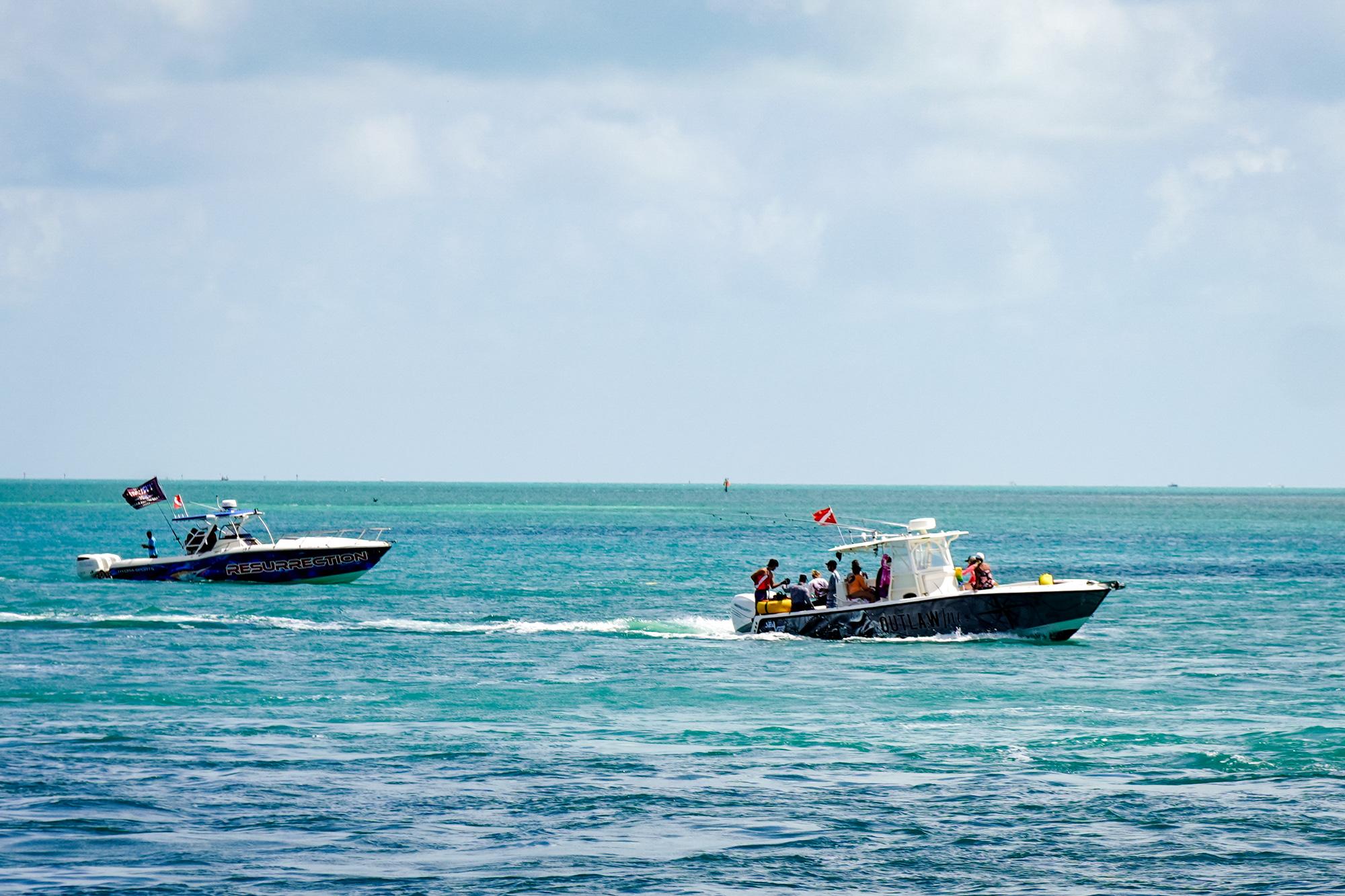
How to Catch a Feast
Divers are required to purchase a lobstering permit, a $5 add-on to a $17 saltwater fishing license.Then they legally can seek the quarry that hides in shallow, warm, tropical waters.
The red, 10-legged crustacean with a spiky exoskeleton is prized for the meat in its tail. The Florida variety doesn’t have large, meat-filled claws, like its New England cousin.
Wild lobsters hide during the day under outcroppings of rock, wood, and other large objects. To get them out, divers swim to the ocean floor, find a likely hiding place, and poke into it a long metal stick. They try to “tickle” the “bugs”—as the creatures are called by those who hunt them—out of their holes and catch them in a net as they flee.
Down on the sandy ocean floor, Nicki Pacha, 25, and her mother Dee Pacha, 67, circled a cluster of coral and rock. They could see lobsters huddled within.
They poked their ticklers under the rock, gently jerking them in a scooping motion. The goal was to coerce the lobsters to exit the hiding place and swim past them.
They’d have to act fast to position their nets right at the mouth of the lobster’s hide-out. If everything goes according to plan, the lobster will swim right into the trap.
If a lobster is caught, a gloved diver first must flip it over to check for eggs that may be clinging to the bottom side of its tail. If there are no eggs, the diver next must use a measuring stick to check its size.
If the protesting bug passes inspection, it gets zipped up in the bag bound for the surface.
For a lobster to be a “keeper,” the carapace—the firm shell covering the head and legs—must be at least three inches long. Any lobster that’s smaller or is carrying eggs must be released.
Captain Tony Young, owner-operator of Forever Young Charters in Islamorada, compared the two days of early lobstering to the opening day of any hunting season. The opening days offer lobsters aplenty, he told The Epoch Times.
“It’s the best time of the year to catch lobster in the state of Florida.”
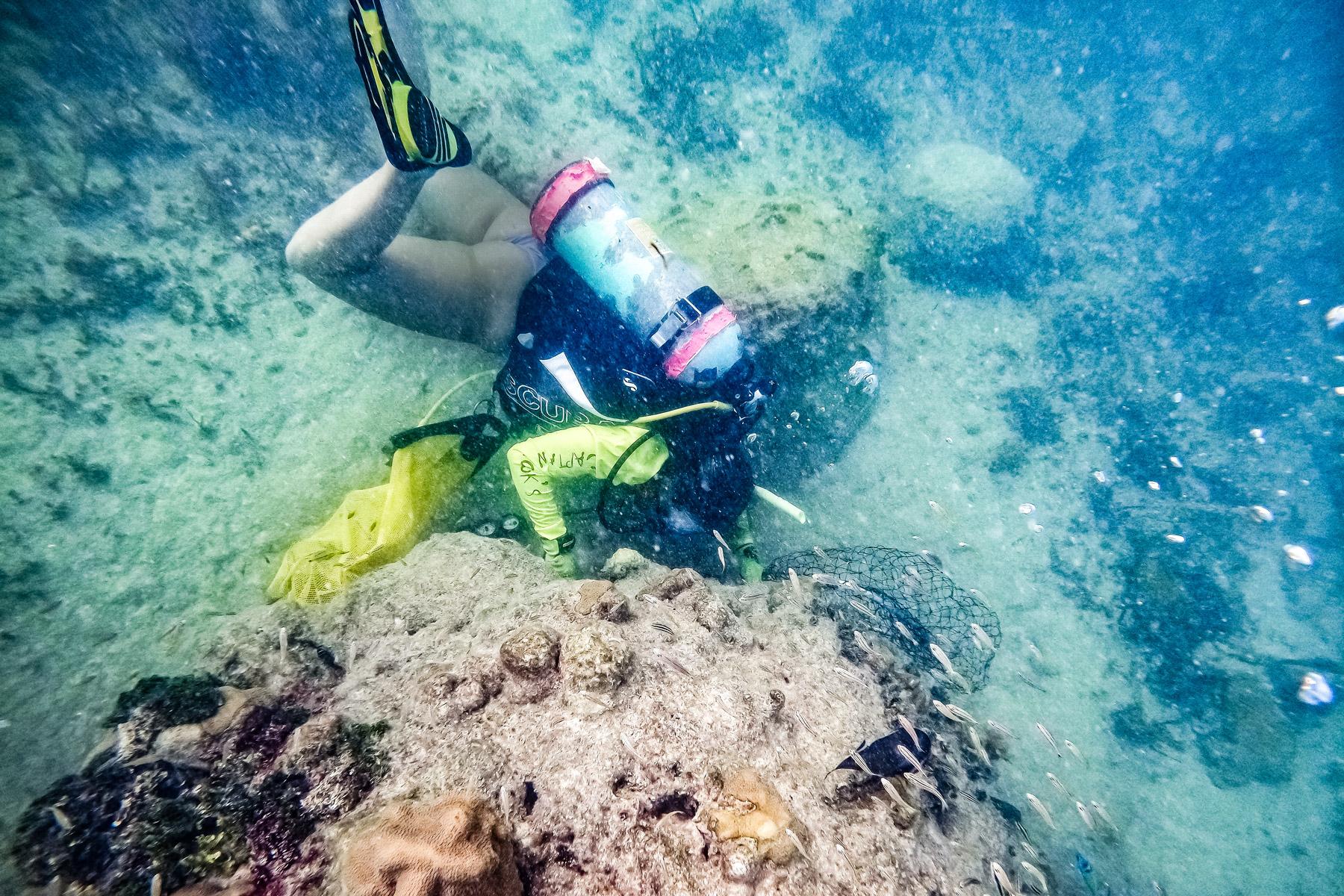
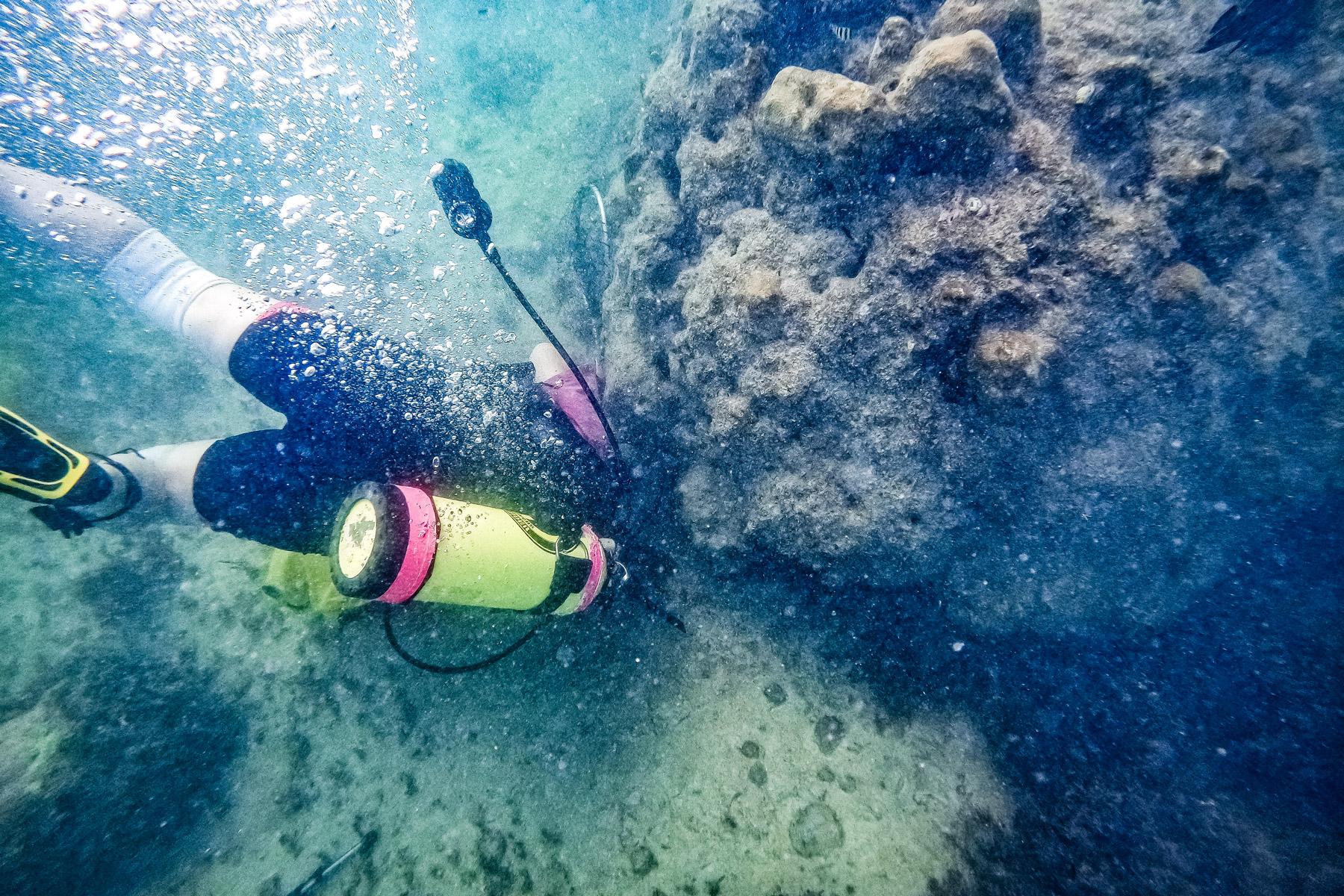
Boat or No Boat, the Hunt Is On
A boat isn’t even a requirement.Along U.S. Highway 1, boatless lobster hunters park their cars along the side of the road and wade into shallow water.
They climb out of their vehicles, donning an array of wetsuits, rashguards, and bathing suits. They awkwardly carry nets, fins, and dive flags under their arms. They step out cautiously on the rocky coastline and plunge into the water.
Later, the waterlogged variants waddle back to their vehicles, many with bags brimming with lobsters.
Aaron and Jenny Prost stood on the shoreline at the southern end of Marathon, a city on a narrow stretch of land in the middle of the Florida Keys, watching their boys hunt in the shallow waters on the second day of mini-season.
The couple from Venice, Florida, has gone on diving adventures together for years. This was the first time their two sons joined in on the fun, hoping to bag a few keepers.
Suddenly, their oldest, Samuel,14, popped up next to his diver-down flag about 50 yards from the shoreline.
“I got one!” he shouted.
But he wasn’t sure his catch was big enough to keep.
His father shouted back instructions on how to take a proper measurement, telling him to keep the lobster in the water until they knew for sure, according to state regulations. Lobsters, like fish, have to remain underwater to breathe.
Making sure to gently hold his catch below the water’s surface, the teen shuffled toward the shore for help. After a few moments, his father announced bad news: the lobster was millimeters too short.
Samuel groaned and slumped, then trudged back out from the shore to put the lobster back where he’d found it.
He'd faced a harsh reality of lobstering: It’s not as easy as advertised.
Lobsters are fast and tricky, and divers require a certain set of skills to catch them.
All the energy spent swimming in open water, all the time spent holding one’s breath, and all the effort spent struggling to stay down, stay level, tickle, and grab a lobster can leave a diver empty-handed.
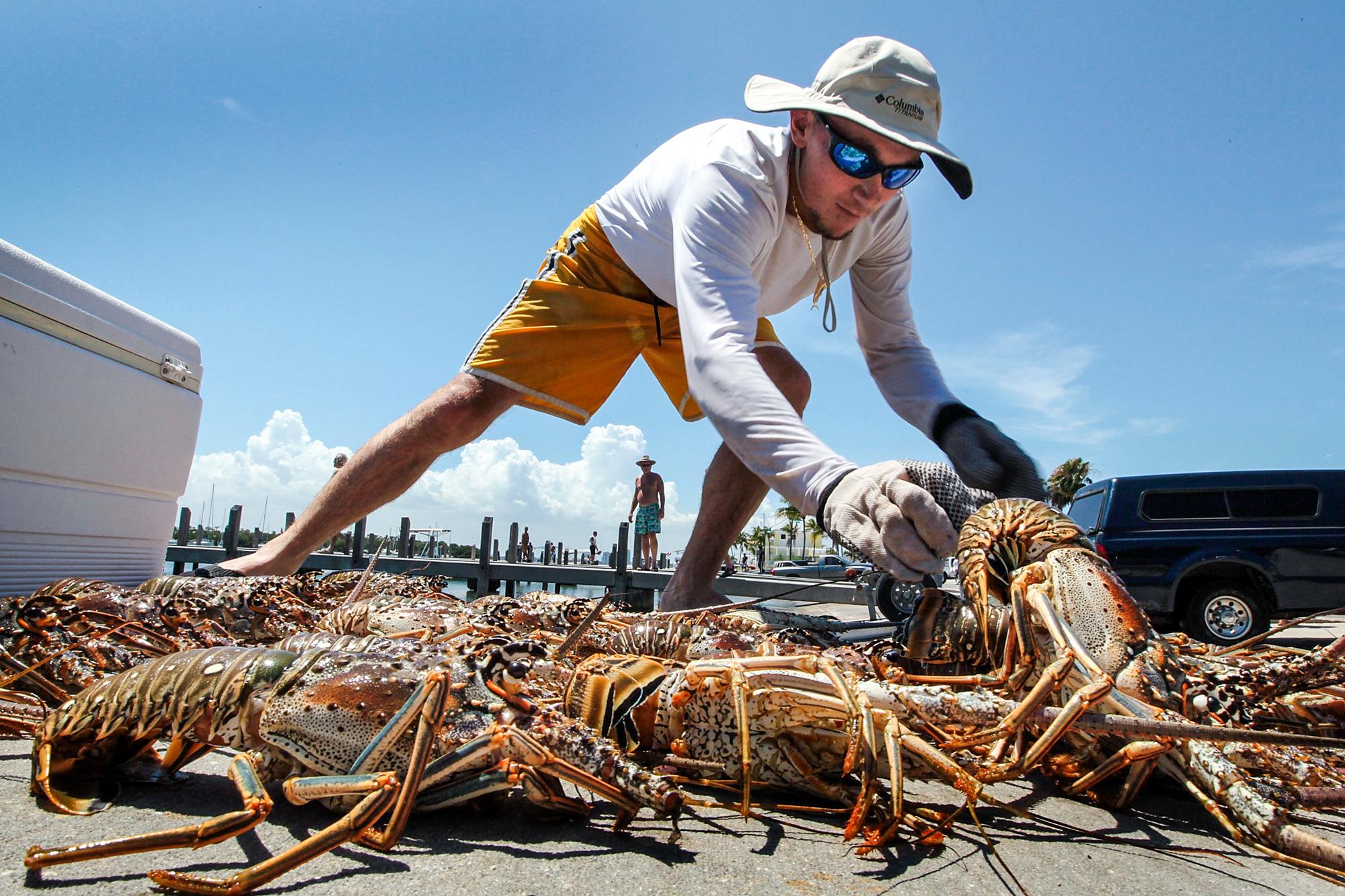
Keeping It Legal
Jeremiah Wann and his family from Mercer, Pennsylvania, rounded up about 10 lobsters during mini-season by snorkeling right off the pier of their vacation home on the ocean side of Tavernier, Florida.The Wann boys—Holden, 16, and Lennon, 14—already knew the struggle of finding lobsters large enough to keep.
After four years of working on their lobstering skills, they’ve steadily improved, they told The Epoch Times. But they know the disappointment of catching lobsters too small to keep.
Plenty of others were caught ignoring the rules this mini-season. And that can bring serious consequences.
Of the dozen citations issued over the two days by the Monroe County Sheriff’s Office, most were for possession of too-small lobsters.
Lobster hunters face the same maximum penalty for taking a lobster with eggs, using a spear to catch one, or taking more than the law allows. Each violation may be charged separately.
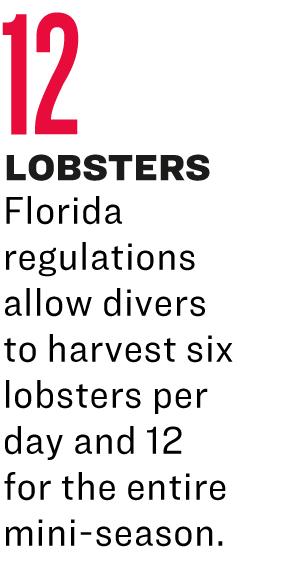
State regulations allow divers to harvest six lobsters per day and 12 for the entire mini-season. A larger limit can be earned by helping the FWC eliminate an unwanted species from Florida waters.
Pacha and his family have taken that bait.
They participate in the FWC’s annual lionfish challenge, which offers prizes for divers helping to remove the venomous, invasive fish from reefs.
One of the prizes is a coin worth the right to take two extra lobsters during the mini-season. It’s earned by catching at least 25 lionfish or a combined total weighing at least 50 pounds.
By the end of the day, the Pachas had filled their boat’s cooler with 16 angry, snapping lobsters. They toasted their success with cold beer and later reflected on their close call.
While underwater, Nicki Pacha, 25, heard the idling of a boat above her, engines revving and clicking in and out of gear. She and her mother exchanged glances.
The 25-year-old medical student has been exploring underwater for about 20 years, both as a free diver and later as a scuba diver. Her parents have been diving together for 35 years.
Was it their family’s emergency signal? Three revs of their boat’s engine would be a call to surface.
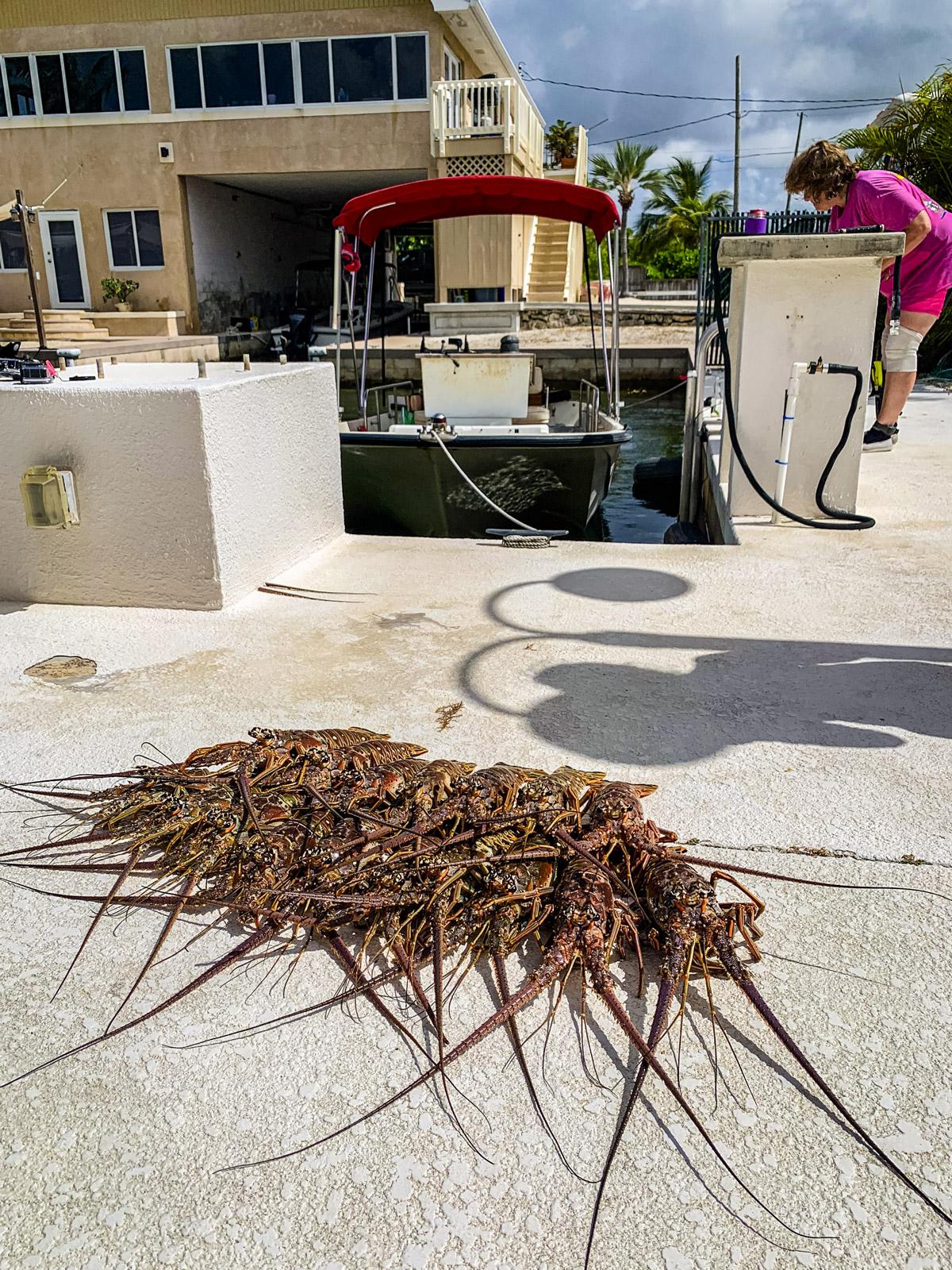
She and her mother froze.
“We wanted to make sure whether or not it was our boat or if somebody’s running over us,” Nicki Pacha said.
On the surface, the other boater called out, asking if their were diver’s beneath the surface.
Pacha threw back a furious “Yes!”
That’s when the other vessel rumbled away.
Because they were scuba diving and had plenty of air in their tanks, and because they were deep enough, the two women were able to stay beneath the boat and avoid catastrophe.
But not every lobster diver has that luxury when dangerous boating mistakes occur.
Broken Rules Can Cause Injury
Snorkeler Sean Steven Bender, 20, of Seminole, Florida, was injured seriously when he was struck by the propeller of a 19-foot vessel going under the Boca Chica Bridge, according to FWC. He was airlifted to a Miami hospital. The investigation is ongoing.“It’s usually when somebody ignores the dive flag, or they have no idea what it means,” Jeff Pacha said.
When the red-and-white diver-down flag is displayed in open water, state regulations require approaching vessels to stay 100 yards away.
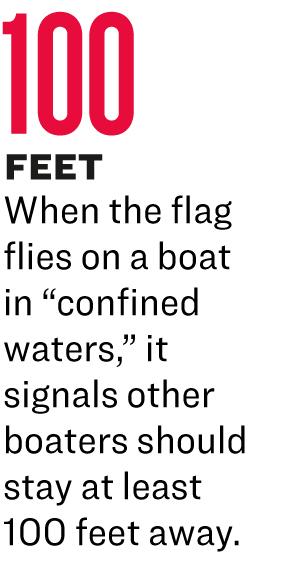
When the flag flies on a boat in “confined waters,” such as inlets or channels, it signals other boaters should stay at least 100 feet away.
But in some instances, when the hunger for lobsters is fierce, that same flag seems to act as a magnet, suggesting quarry is there for the taking.
“If you don’t know where you’re going, and you can’t physically see the [waterway] bottom, it’s a challenge” to see divers, Jeff Pacha said. “It’s so dangerous, and so many people just don’t have a clue.”
He understands that boaters with less experience covet the guidance of knowing where the hunting is good.
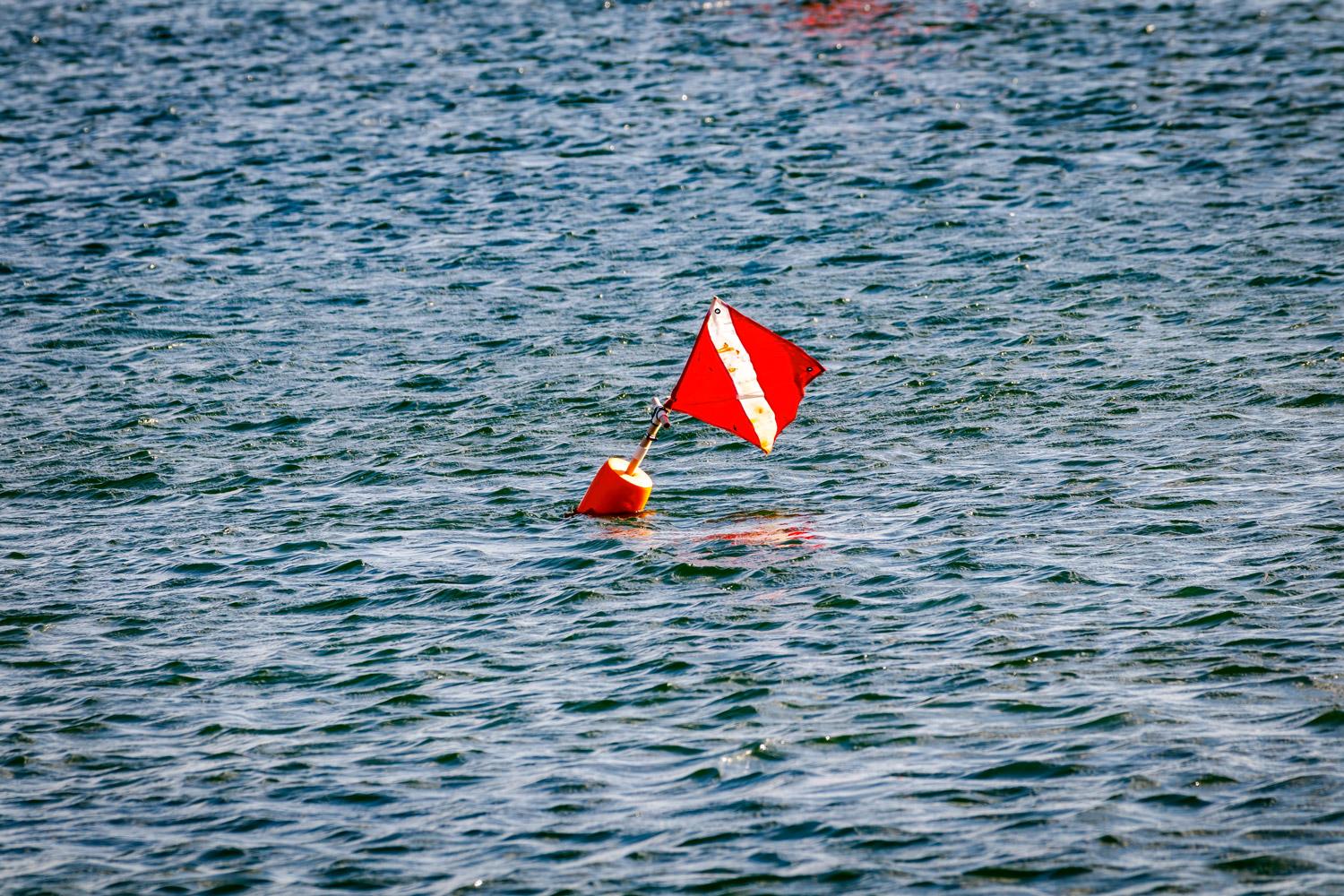
“I kind of get both sides,” he said. “They don’t know where they’re going. It’s an open ocean and it’s a free place. But, it obviously can be so dangerous.”
And law enforcement officers aren’t aiming to spoil anyone’s fun. But the law’s the law.
“We’re out there to educate people and keep people safe, so most people are not in gross violations of multiple different laws,” MCSO spokesman Adam Linhardt told The Epoch Times.
When their close call happened, the Pacha family’s boat was anchored on the eastern side of the Keys, officially in the Florida Straits. A strong easterly wind kicked up the surf, and the boat rolled with three-foot swells.
With the other boat gone, a smile returned to Jeff Pacha’s face.
The seasoned spearfisherman reclined in his captain’s chair with his feet propped on the center console. He’d chosen the rougher waters of this spot to avoid congestion in the smoother waters on the Gulf of Mexico side of the islands.
“If you were to get on a boat and go to the Gulf right now, you almost can walk [across the boats]. It’s that close,” he said. “I hate it. I don’t ever go back there.”
Indeed, on that side of the waterway, eager boaters encroached on one another. Anchored boats with divers in the water blew their horns to ward off the incoming traffic. Some deployed buoys with additional diver-down flags to clearly stake out their safety perimeter.
But intruding boaters weren’t the only danger.
Submerged divers, who aren’t always visible to boaters at the surface, appeared to wander beyond their designated safety zone.
And solitary diver flags, which normally signal the presence of a diver who waded in from the shoreline, drifted dangerously close to bridges and the main channels reserved for boat traffic.
In narrow Tavernier Creek, vessels traveled in both directions, maneuvering around blind turns to find boats parked with freedivers hugging the mangrove-lined shore.
Even a boat with its propellers switched off can cause serious injury to divers.
But the lure of lobster seems to make the danger worth it for many.
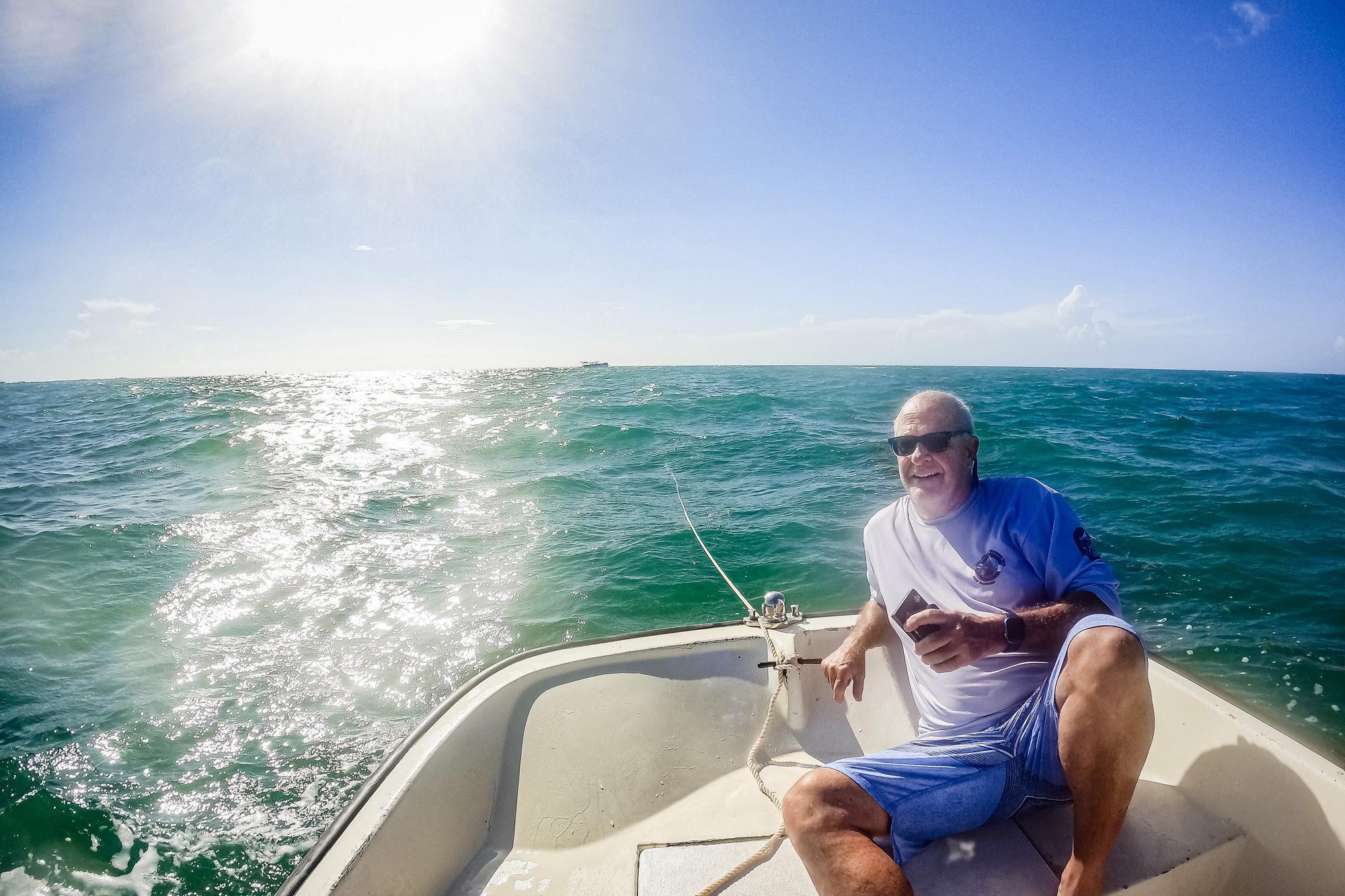
Family Fishing
Despite the risks, Florida’s lobster mini-season continues to attract out-of-town families year after year. Families like the Wanns, the Prosts, and Young’s regular customers flood into the area each year.“We’ve watched their kids grow up,” Young said. “Some of them have been diving with them for seven, eight years.”
For these families, crowded, frenetic mini-season is their only chance to experience the thrill of catching lobster before school starts again. And it offers the chance to share an adventurous tradition that teaches children to catch their own food, learn and obey the law, and appreciate nature.
The Pacha family lives in the Keys.
But mini-season is their only chance to dive together before college starts again.
Otherwise, they’d prefer to pass on the risks of mini-season, leaving it to out-of-towners.
He finds plenty of lobster in September when the Keys are “so empty, a lot of restaurants close,” he said.
Taste of Victory
As the sun set on July 25, many divers spent the waning hours of the 2024 mini-season preparing their tails and melted butter for a well-earned feast.But not the Wann family—at least, not yet.
For their planned feast, they needed one more menu item.
Jeremiah Wann’s sons and nephews dropped their lobster horde into live wells on his boat. Together with his sister-in-law and a local fishing guide, James Mullen, they rumbled out into the night.
High-tech GPS and navigational systems allowed Wann and Mullen to chart a course northeast, aiming for a shipwreck known to be home to the lobster-loving cubera snapper. The elusive fish, also known as the Cuban snapper, grows to about 125 pounds.
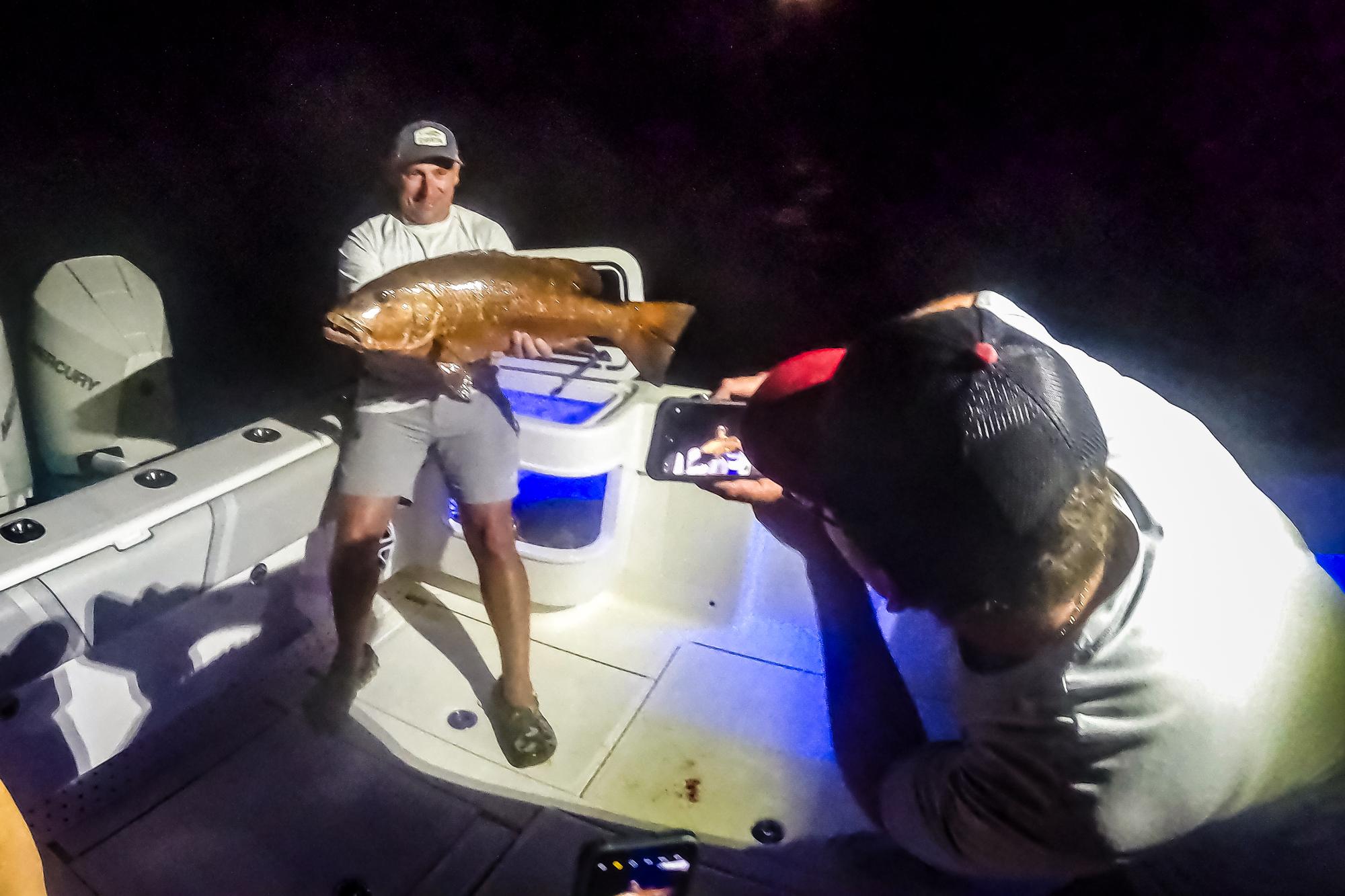
Wann, 48, had been after the prized game fish for the four years he and his family had been lobstering. It had always escaped him.
Tonight, as his time in the Keys was drawing to a close, it was his last chance to catch his prize this year. It had been a challenge even to prepare for the hunt. First, they had to catch the best bait.
Cubera snappers seem to love the taste of live Florida lobster, he said.
Mullen, 26, expertly guided Wann to the wreck, which rested 200 feet down and several miles offshore. There, the boat rocked on rolling four-foot swells. Light from South Florida peeked out from the western horizon like perpetual twilight. A dimmed outline of the Milky Way appeared above, ahead of the rising full moon.
Mullen rigged the lobster to the line and lowered it down, as the boat drifted over the wreck. All aboard anxiously waited for a tug on the line, evidence a great snapper might be nibbling the bait.
Meanwhile, Mullen mused on the effects of lobster mini-season on the delicate environment of the Florida Keys.
“I’m sure that it’s great for the economy, and a lot of people really enjoy coming down here to do it,” he said. “But there are too many people on the reefs who think it’s a free-for-all and are just tearing them up.”
Checking the radar, he saw the boat had drifted way from the wreck. They reeled in the line, repositioned the vessel, and started the process over again. Several times, the process repeated.
Then a shout pierced the darkness.
“You got him! Reel! Reel!” Mullen shouted.
Wann cranked the massive fishing reel as fast as he could.
“Keep going! Keep going!” Mullen urged. “Don’t let the sharks get him!”
A few cranks more, and Mullen dropped a hook, known as a gaff, over the side of the boat and hoisted the fish into the boat.
Cheers erupted as Wann picked up his dream fish, beaming with satisfaction. It weighed somewhere between 20 and 30 pounds, which Mullen confirmed was the perfect weight for eating.
The next day that snapper and the remaining lobsters were the highlight of Wann’s victory feast. He cut the lobster tails in half and grilled them with lemon butter.
When asked which he thought tasted better, Florida or New England lobster, the northeasterner paused for a moment.
Florida, he said.
